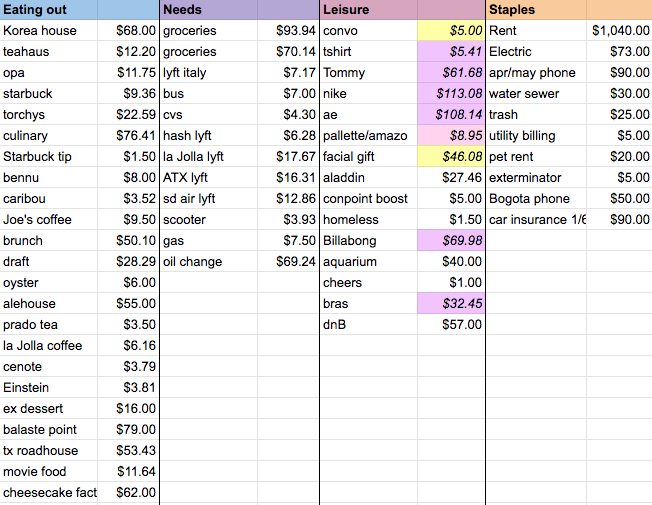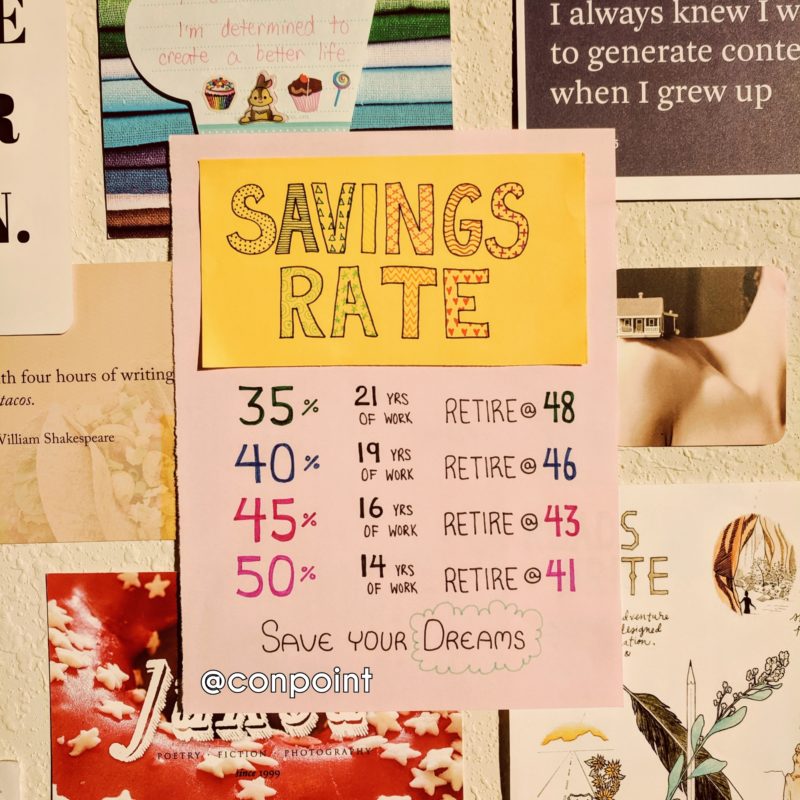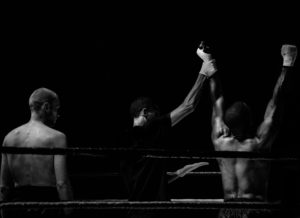It’s 2021 and I’m 28 years old. I’ve been working for 7 years since graduating college in 2014 and this is my first real career break. I’m still employed, BUT it’s the first time in my adult life I haven’t been working for 4+ weeks straight (gratitude to my employer for working with me to arrange this). To properly reflect on how this upcoming month will change my perspective, I’m going to answer the same questions at the beginning and end of my 1-month career break.
I’m on Day 3 of my break. Had to spend the first couple days totally vegging out and resting. Right now, I’m on the patio of the Greater Goods Coffee Shop on 5th and Pedernales Street in Austin, sweating my ass off because indoor seating is closed due to COVID.
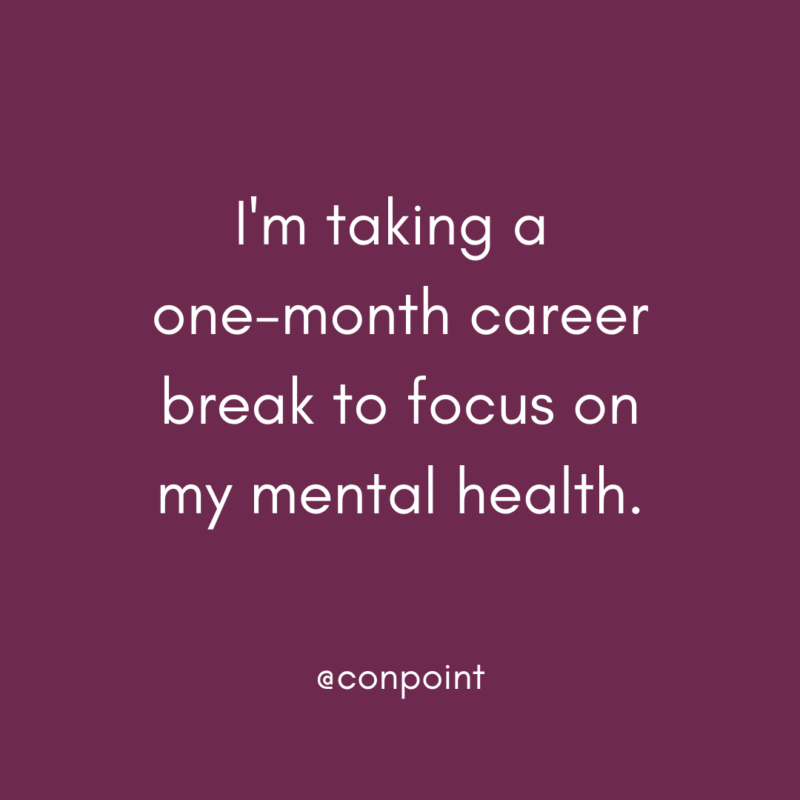
1. How do you feel about work?
Work is a necessary evil. Work is necessary. I can respect that it brings me closer to my goal of financial independence. Money-motivated work and I are not compatible though. Fire and ice. Oil and water. I’m willing to do a job well, but don’t think for a second it means I’ve bought into the idea we were meant to live this way — 40+ hours a week until our late 60s, a couple weeks of “time off” if we’re lucky.
I consider any work that is intrinsically enjoyable to be a hobby or a passion. As soon as we monetize it, it becomes a job, which to me feels like a chore. I don’t think I would enjoy a writing job any more than a recruiting job. It’s all forced labor at the end of the day. The reason I enjoy hobbies like writing is because I have complete freewill, all deadlines are self-imposed, and the work/joy is completely separate from my money.
The ideal FI/RE doesn’t stand for “retire early.” It stands for recreational employment. Money needs to be an afterthought for me to truly enjoy my job, which means I need to become Financially Independent before I entertain Recreational Employment. Well, maybe it’s a sliding scale as I get closer. I’m still figuring this part out.
2. How do you feel about money?
The pursuit of money is going to unlock more valuable parts in me. I used to say I loved money, but that’s not entirely true. I love the freer version of myself. I love when I have an abundance mindset. Money isn’t just a tool for living a better life. It’s a way of showing ourselves how powerful we are. And that’s never been determined by a dollar amount.
I still struggle breaking the tie between my earning power & my self worth though. It’s hard when it’s so intertwined with doing good work and being rewarded in a professional setting. I wonder if I’m slowly becoming too money-centric/greedy. People praise wealth-building for its ability to break generational curses and create opportunities, but it can also be an addiction. Like other addictions, if you haven’t experienced it firsthand, it’s difficult to explain why stopping is so hard.
3. What are your thoughts around financial independence?
Everybody wants it, but not everybody knows it. (🎶 Everybody dies but not everybody lives!) Money not being an issue opens up options for everyone. No matter what your life purpose, your dream becomes more attainable when you aren’t dealing with financial anxiety or insecurity. Having money allows you to focus on what you want, not what you need. It gives you the capacity to pursue engagements beyond your basic necessities.
I can’t wait to be fully financially independent. It’ll be bittersweet since I do enjoy the journey. Even as I’m building more of a safety net, I feel more control over my life. I have options. I have Fuck You money. Financial stability feels like reclaiming power from your employer:
“I’m not scared of you anymore. You wanna fucking try me today? Try me. Let’s see what happens.” *shakes my tiny fist at the air*
4. What’s the hardest thing about not being financially independent yet?
I’m a writer, which means I value self-expression. I love being able to say what I think, unfiltered. But in today’s digital age, where the boundaries between work and home life are eroding and every fleeting opinion is documented for eternity on social media, it’s increasingly hard to be two separate versions of yourself. Hell, it’s nearly impossible to shed your younger online persona, let alone the Current You that exists outside of work. When an employer hires you, they are hiring all of you, whether you/they like it or not. Anything you say publicly outside of work hours can be held against you. So when we talk about being “someone else” to hold down a job, you aren’t being that person for 40 hours. You have to be them 24/7.
It feels wildly oppressive to me—that to some degree I have to change who I am, what I stand for just to survive. That’s some bullshit. The thing I’m looking forward to most when I’m financially independent is not freedom of speech, but freedom from consequence.
5. What do you enjoy about still being on your money journey?
I think the Come Up story is inspirational. Humble beginnings. Overcoming adversity. I have a weird obsession with meeting the definition of “self-made,” which is so subjective/doesn’t really exist. I come from a lot of privilege (being raised by two parents, no student loans, being White-adjacent as a Chinese American, etc.) so I fear whenever I reach success, people can discredit my accomplishments. Maybe that’s why I’m so inclined toward hardship—to have some battle scars I can point to and say, “Hey! See? I struggled, too.”
We never make it alone though. I’m grateful for the community I’ve gained through my money journey, both strangers and reconnecting with friends/acquaintances in a new way.
I also enjoy how conflicted I feel right now about work & money. Because that relatability is what some people need to make changes in their own lives. I will get to the other side of this. And once I do, I’m coming like a monster truck for all the people who need that push, too.
6. How do you feel about your finances?
I feel proud of where I am financially. I have a substantial portion of my assets in the stock market working for me. My emergency fund could be beefed up, to be honest. It’s about 2-3 months of basic living expenses. Not awesome for pandemic times. I’m in the middle of reading “I Will Teach You To Be Rich” by Ramit Sethi and it feels nice that I’m already employing many of his recommendations. It feels like I’m on track. The biggest thing I need to work on is probably my mindset around spending money without guilt.
Ramit recommends allocating 20-35% of your income toward leisure spending. From my Jan 2021 to May 2021 data, I spend about 8.5% of my income on fun stuff (eating out, clothes, beauty, crafts & hobbies, and such).
My financial IQ is strong. My financial EQ? Needs improvement. The reason I’m so frugal is I can’t imagine any short-term expense that would bring me as much joy as never working again. Gotta find that balance.
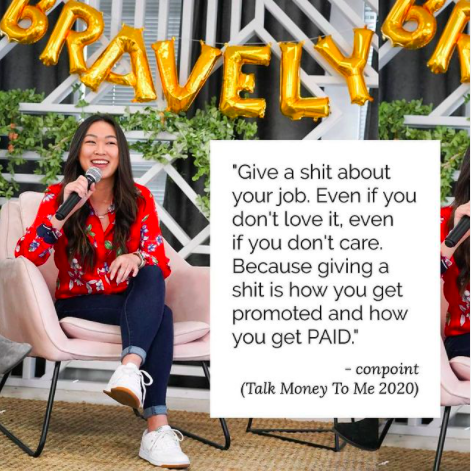
PC: @sharisraa
7. How is your physical health?
I went to the chiropractor the other day for my 2nd adjustment. *Crack crack* My upper back has been killing me for a year+. Probably a mix of slouching over my laptop and not having an ergo setup. When I joined my current company, my physical health took a hit. I was way more sedentary than before. The sheer stress of being at hyper-growth company and always rushing to the next thing…I haven’t been taking care of my body the way I’d like. I did start running in January though. Been starting my mornings with it this week. (#conpointrun2021 on IG) Running has felt really good for processing my thoughts and anger.
8. How is your mental health & spirit?
*Sigh* I think I’m in a stable place now. But Q1 was an absolute shitshow. The light at the end of the tunnel for me was this break. I don’t know how I’d be if I didn’t have this time to myself. I’ve never been more worried for my mental health.
In Mandarin Chinese, there’s this word “mìng” — Google translates it to “life” but I think it’s closer to a soul, but deeper. Like the essence, heart, and humanity of person all wrapped into one. It’s one of those words I learned growing up where I couldn’t figure out the English translation. I don’t think it exists. It felt like my mìng was deteriorating this year and I was just watching it die.
When I was a kid, my mom talked about how some people don’t just trade their time for money, they gamble with their mìng.
Innocent me: “Why would anyone do that? I’ll never be one of those miserable adults.”
Adult me: AHAHAHHAHAHAH
9. How do you feel about where you are in life?
I think this month off will be one of the most transformative periods of my 20s, and even 30s. I’m happy with my on-paper accomplishments. The fact that I haven’t quit recruiting yet is fucking mind-blowing. I must hate or love myself. Probably both. I appreciate my grit & big picture mentality when it comes to designing my life. I’m very excited to see where I’ll be in 5 years. I’m excited to be where I am now.
10. What’s one thing you would change about your personality?
I have a lot of fury. About many things. Even as I’m editing this post, I’m like, “Maybe I should calm the eff down before I hit Publish.” Sometimes, it feels like if I weren’t this angry at the workforce, I wouldn’t be on this doggish, desperate pursuit for financial independence. If I weren’t this angry, would I be having an easier time? Could I enjoy my job & my life more if I didn’t think of it as a dire situation to escape? I’m absolutely pissed at least a couple times a day. But I’ve felt it for so long, I don’t know if I’ve confused it for passion or vitality. My passion for finance is a euphemism for my extreme resentment toward work and American hustle culture.
11. What’s one aspect of your personality you would share with others?
The way I love myself. The intensity. The loyalty I have for myself.
“Isn’t it cool how we get to wake up and be in the same person’s body everytime?” I asked my sister once.
“How else would it be?”
“If every 24 hours, we woke up as a different person, we would have no incentive to invest in our future.”
When we have the privilege of being ourselves every time, why wouldn’t we try to build a good future? Sometimes, I worry I love Future Connie too much. I could spare some of that love for Present Connie.
12. How do you feel about your work persona?
“Work Connie” is my professional persona. I created her because I quickly understood that my natural self couldn’t compete with the her earning potential, at least not in the context of performative, corporate environments. Work Connie generally knows how to say and do the right thing. She observes how other people get ahead at work and she mimics the behavior. It’s almost like Machine Learning—Work Connie is Artificial [Professional] Intelligence.
How do I feel about her? Hmm. Work Connie’s motivation is making money. And I don’t think anyone that obsessed with money can really be trusted on a personal level. Don’t get me wrong. I appreciate what she’s done for me, but she is programmed to do the self-interested thing, not necessarily the right thing. Her code: I walk the path of least resistance to money. I’ve felt turmoil around whether it was morally corrupt to have a Work Persona.
Me: “Isn’t that kinda two-faced? Insincere?”
Work Connie: “Some of us have bills, Connie. You gonna pay those with your true colors? That’s what I thought. Now shut up and take me to work, we’re late.”
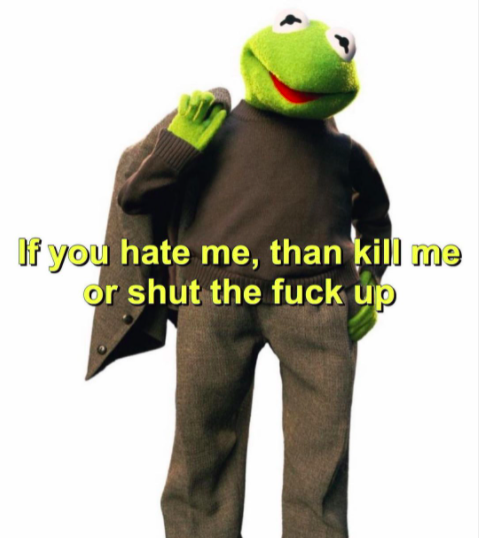
13. How do you feel about your authentic self?
I admire her courage, but I wonder if it’s misplaced. Authentic Me (I also call this conpoint) gets the glory while Work Connie gets to be made out as the Bad Guy. Work Connie bankrolls the safety net people often mistake as bravery. It’s easy to be “brave” when you have money to fall back on. It’s easy to risk something like a job when you can afford to lose it.
All in all, she’s aight. XD Authentic self can be lost once you start gaining a “platform” on social. I kinda hate that. While it’s awesome to be able to reach more people through writing, I don’t like the idea that people stop seeing me as a person. Even the terms content creator, financial blogger, finfluencer (as in financial influencer *gag*)…feel so jobby. Like I’m suppose to stand for certain things or be an Official Brand©. The evolution of a person becoming a business. Woof. I just want to say things with the normal liabilities & consequences, not the corporate ones? All the roses and thorns of putting yourself out there, I suppose. Yes, I accept the Terms & Conditions.
My passion for finance is a euphemism for my extreme resentment toward work and American hustle culture.
14. Are you happy?
In this moment, I am. I take a long time to write, so I’m no longer at the coffeeshop in Austin—I’m at my sister’s house in Georgia, drafting this mammoth blog post. I had dinner with my family last night. My niece woke me up this morning with the daintiest “wake up” whisper in the history of mankind. :,) She’s old enough to brush her own teeth now, it’s wild. I am madly in love with a man who is madly in love me. At the same time! How wonderful is that. And he texted me that Teddie misses me and has been waiting by the front and back doors for me to come home. I live a near-perfect life. Work is just a fly in the French Onion Soup of my life. And even then, sometimes he’s a nice fly, a guest accompanying me for dinner.
15. What is something you hope to learn about yourself? (After the break: What is something you learned about yourself?)
I wonder if I’m capable of relaxing. Seriously. Life has been pretty #countrypace these last few days. But I still have a lot of internal pressure to do stuff for @conpoint and take full advantage of writing time (for myself). There were a lot of exciting conpoint opportunities coming through this year, but work was so busy I couldn’t make time for them. So even though I’m resting for a month, I’m trying to cram in The Rest of My Life I’m used to de-prioritizing because of work.
16. How do you think you’ll feel after your career break?
I think I’ll feel enlightened. Even though I feel fluid in my life direction, I don’t think I really know it yet. In a couple weeks, after I’ve lived at a leisurely but self-disciplined pace, I will really believe my existence and purpose is of my own making.
I hope I feel less riled up haha. My job isn’t a bad place to return to—it’s a company of good people with cool projects & meaningful opportunities…that happens to be going through a bit of a rough patch. No matter how much I try to disconnect and let go, I’m really emotionally invested in my work, my org, my teammates, especially if I have a stake in their development. There’s a saying from my alma mater Carnegie Mellon that rings true, no matter how much I try not to care:
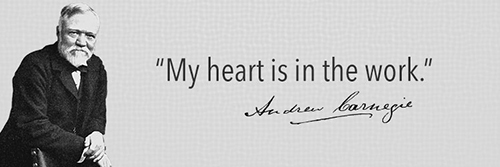
17. How do you think you’ll spend the next month?
I hope I finish a bunch of books! I have so many half-read ones, then I get new ones before finishing the old ones. A few on my bookshelf:
- Becoming by Michelle Obama
- I Will Teach You To Be Rich by Ramit Sethi
- On Earth We’re Briefly Gorgeous by Ocean Vuong
- Your Money Or Your Life by Joseph R. Dominguez, Monique Tilford, and Vicki Robin
- The Big Leap by Gay Hendricks
- Anger by Thich Nhat Hanh
I’m also gonna run, play with the dogs, drink coffee. Eat my meals slowly. Write. Be stupidly honest about how I feel. Spend time with family. Block my social calendar during June & embrace solitude. Feel at peace. Breathe easy.
18. How do you think you’ll feel about returning to work?
I don’t think I’ll want to go back, but this is not news or a red flag. I’ve never wanted to return to work. This is a money career for me, not a passion career. Interest isn’t a prerequisite for my employment. Needing money is the prerequisite. So the good news (for my employer) is I will still need money in a month.
The empathetic part of me: How would I feel if I were my manager? There’s an employee who didn’t like work to begin with…taking a month break to recover from burnout…. I’d think: “This bitch has one foot out the door. She isn’t coming back.”
Optically, I can see how one would assume that. Which is why before I left, I gave my manager my word I was coming back. I respect my management chain, I care about them as individuals outside of work. I may not have an ounce of company loyalty, but I am fiercely people-loyal. I won’t do you dirty.
My word is my word. And if you can’t take my word for it, then cynically: I’ve been coming back to work against my freewill for 7 years. What’s another month, really? 😐
The things I think I’ll miss from work: the people, the feeling of mastery/accomplishment, the sense of community & winning as a team. My manager literally just texted me that I was nominated and won an award for excellence within my department. *sigh* I’m extremely grateful for my work situation. Makes me think: “hey Connie, maybe we be less of a salty bitch today? Whadya say?”
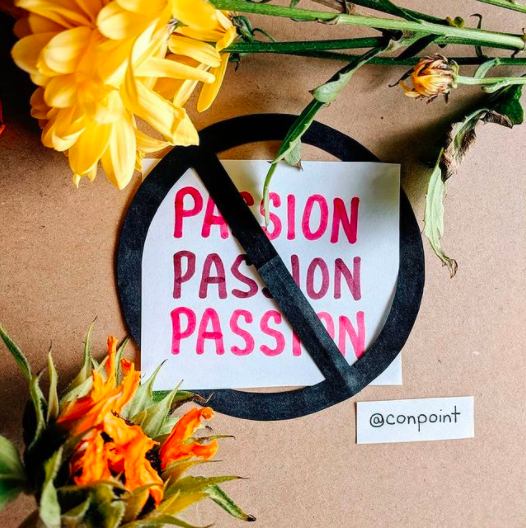
19. What do you want to say to Future You in 30 days?
I trust you. Remain unshakeable. YOU have the power to create time. The power to take it back. The onslaught of work stress is a fucking scam. You are a whole, human soul. A soaring spirit. Lemme ask you: Does a bird check email?
I am resolved in ruthlessly eliminating the things that violate my peace.
20. What do you want to say to Future You in 5 years?
Hey 33-Year-Old Connie! You look fine as fuck, you’re welcome for all the exercising I did. You are probably closer to financial independence than we’ve ever been. If not, then I’m proud of you for making that career switch or taking that risk because you realized our happiness was more important than our net worth.
*IF* you are still in the same conflicted headspace and need a push for change: I want you to recognize work is no longer your oppressor. You are. You’re choosing to stay when you have the means to leave.
One question for you: Do you feel at peace?
I—28-year-old You—am resolved in ruthlessly eliminating the things that violate my peace. I hope in growing older and wiser, this hasn’t changed for you.
No peace, no mercy.
21. Favorite song of the moment?
“Angels Like You” by Miley Cyrus. It feels like a tribute from Authentic Me to Work Connie:
I know that you’re wrong for me /
Gonna wish we never met on the day I leave /
I brought you down to your knees /
‘Cause they say that misery loves company /
It’s not your fault I ruin everything /
And it’s not your fault I can’t be what you need /
Baby, angels like you can’t fly down hell with me /
I’m everything they said I would be.
See you all in a month for Part II, the “After” post!


